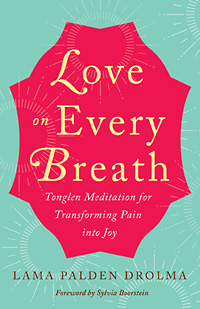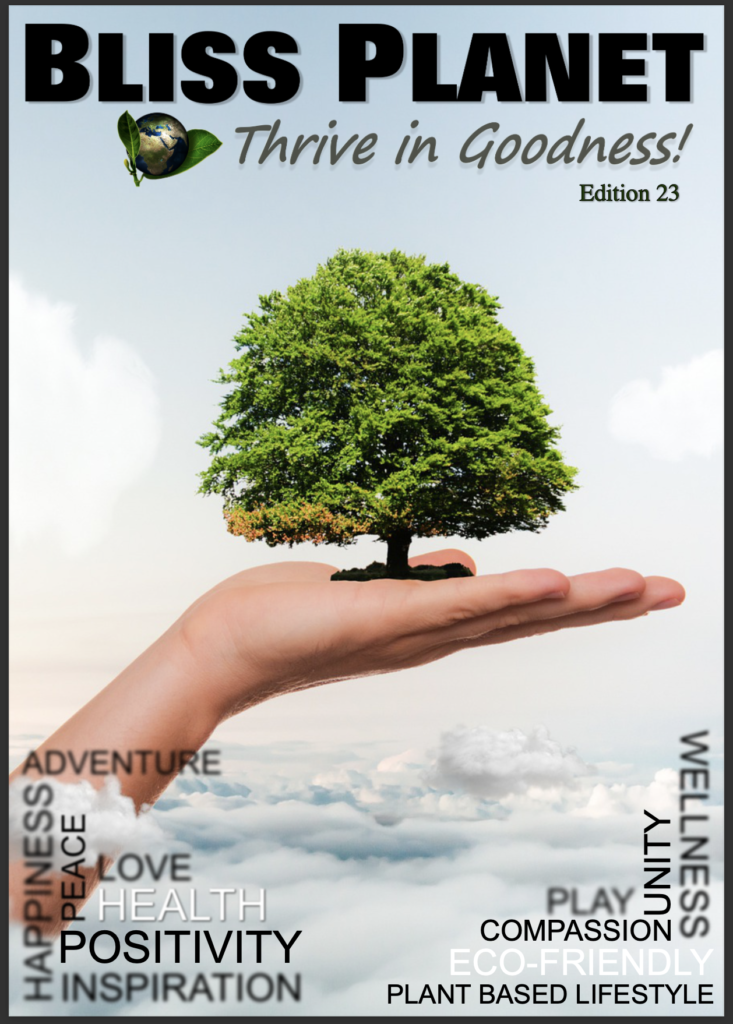An excerpt from Love on Every Breath by Lama Palden Drolma
At this time, when our human family is facing many challenges, it is more important than ever that we find peace and sustenance in our hearts. In the new book Love on Every Breath: Tonglen Meditation for Transforming Pain into Joy, author Lama Palden Drolma introduces a profound, ancient meditation that has been practiced in isolated mountain retreats in the Himalayas for centuries, which is now available to the modern world.
In the standard Tonglen, the meditator simply breathes in the suffering of others and then breathes out love and compassion to them, but this approach does not always work well for Westerners, who often find it difficult to get past the ego’s roadblocks. That is why Lama Palden prefers to teach the more user-friendly “Love on Every Breath” variation to Westerners, which comes from the Shangpa lineage of two enlightened women.
We hope you’ll enjoy this excerpt from the book.
Love on Every Breath is an ancient Tibetan Buddhist Vajrayana meditation from the Shangpa lineage that combines breath, awareness, imagination, and an energetic transformation process. The meditation brings all these components together in a powerful way in order to open our hearts, to reveal and cultivate our kindness, love, compassion, and wisdom. In Tibetan, this is called the Extraordinary Tonglen, since it uses special techniques of Vajrayana to transform suffering. The Tibetan word tonglen is composed of two words — tong means “giving or sending,” and len means “receiving or taking.” First, we open ourselves to receive and feel the suffering of ourselves and others, breathing it into our heart center. This is the “taking.” The suffering is then instantaneously and effortlessly liberated in the heart and transformed by a special method into unconditional love. At this point, on the out-breath, love and healing energy are sent back out to whomever you are doing the meditation for at the moment, whether yourself or another. This is the “sending.”
The primary purpose of the Love on Every Breath meditation is to cultivate our love and compassion, to transform and liberate our heart. When we come from a place of love, everything shifts for us. This book gives you the tools to transform and empower yourself and come to a place of creative engaged freedom.
The Love on Every Breath meditation is not an exotic Himalayan practice, but it is something that emerges out of us spontaneously and naturally. It is inherent in us to want to remove suffering — others’ or our own. The problem for many children (and adults) is that we absorb the suffering of others, and then it stagnates inside of us. Love on Every Breath gives a way for the suffering to be liberated in the body and the psyche and emerge as compassion. There is a felt sense as this happens.
Developing Self-Love
Traditionally, in Tibet, Love on Every Breath involves first developing compassion and love for ourselves before we do so for others. In the West, many people do not experience self-love, but rather self-criticism and self-hatred. We tend to be overly self-centered and often feel that something is wrong with us. Therefore, it is important that we start the Love on Every Breath meditation by generating compassion and love for ourselves. One of my students, a serious meditator for over thirty years, found that meditating on Love on Every Breath for himself healed a deep psychological angst that had not been touched by many years of quiet sitting meditation. It powerfully liberated wounds he had been carrying for many years.
Without love and compassion for ourselves, we cannot sustain love and compassion for others. Love and compassion can arise spontaneously in certain circumstances for all of us, but to fully actualize love and compassion, we need to work through our anger and hurt and have compassion and love for ourselves. Then we can authentically have more compassion for others. Otherwise, it is like living in a home where we behave with harshness and cruelty and then expect to go outside and be open and loving. If we do not include ourselves in our love, our love is not whole, not complete. This is essential. As Aristotle wrote (in Ethics, book 9), “All friendly feelings for others are an extension of a man’s feelings for himself.” It should be noted that self-love and compassion are not to be confused with self-centeredness or narcissism.
Developing love and compassion helps us to grow spiritually and emotionally by lessening our ego fixation and self-centeredness and helping our relationships with others. When we generate compassion, we do not excuse or condone our own or others’ negative actions. Likewise, awakened love does not enable our own or others’ negativity or destructiveness. Awakened compassion understands that everyone is trying to be happy. We often try to be happy in all the wrong ways, such as when we think that money, prestige, and power will bring us happiness. Some people think they will be happy by stepping on, cheating, or destroying others, but we can have compassion for them in their ignorance. This does not mean we endorse or in any way condone their behavior. We need to stand up to their destructive agendas. Our compassion means that we wish for them to be authentically happy and free of suffering — in other words, awakened.
Lama Palden Drolma is the author of Love on Every Breath. A licensed psychotherapist, spiritual teacher, and coach, she has studied Buddhism in the Himalayas with some of the most preeminent Tibetan masters of the twentieth century. Following a traditional three-year retreat under his guidance, Kalu Rinpoche authorized her to become one of the first Western lamas. She subsequently founded the Sukhasiddhi Foundation, a Tibetan Buddhist teaching center in Fairfax, California. Visit her online at http://www.lamapalden.org.

Excerpted from the book Love on Every Breath. Copyright © 2019 by Lama Palden Drolma. Printed with permission from New World Library — www.newworldlibrary.com.





